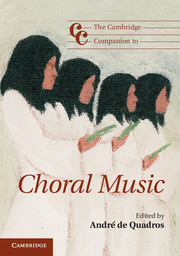Book contents
- Frontmatter
- 1 Introduction: choral music – a dynamic global genre
- Part I Choral music: history and context
- 2 A brief anatomy of choirs c.1470–1770
- 3 Choral music in the culture of the nineteenth century
- 4 Choral music in the twentieth and early twenty-first centuries
- 5 The nature of chorus
- Part II Choral music the world over
- Part III Choral philosophy, practice, and pedagogy
- Notes
- Select bibliography
- Index
- Cambridge Companions to Music
3 - Choral music in the culture of the nineteenth century
from Part I - Choral music: history and context
Published online by Cambridge University Press: 28 September 2012
- Frontmatter
- 1 Introduction: choral music – a dynamic global genre
- Part I Choral music: history and context
- 2 A brief anatomy of choirs c.1470–1770
- 3 Choral music in the culture of the nineteenth century
- 4 Choral music in the twentieth and early twenty-first centuries
- 5 The nature of chorus
- Part II Choral music the world over
- Part III Choral philosophy, practice, and pedagogy
- Notes
- Select bibliography
- Index
- Cambridge Companions to Music
Summary
In his study of Romantic music, Alfred Einstein suggested that the nineteenth century was no longer “a period of great choral music.” He based that judgment on his belief that the large-scale choral works written in that century presented nothing new, only a continuation of genres (mass, oratorio, requiem, motet, etc.) already well established in the preceding century. He dismissed the nineteenth century' s singular contribution to choral repertory – the part-song – as mere musical trifles designed to engage and entertain a new class of amateur singers. While there is an element of truth in Einstein's assessment, he failed to consider the new political, economic, and social realities to which composers of the time were responding. In this chapter, I shall (all too briefly) consider how the new cosmology of the nineteenth century transformed the nature of choirs and the music they sang.
Collision of cosmologies
While 1800 is a handy chronological marker, it is not particularly useful when defining cultural history. To understand nineteenth-century music, we must first understand the ideas of the preceding century that shaped it. The philosophical engine that fueled Europe's growth in the eighteenth century was the Enlightenment, a period dominated by scientific method and reason that postulated that, given sufficient time and information, humanity could construct a new Eden. Correlative to this philosophical stance was the emergence of the Industrial Revolution (c.1750) that offered the ideal laboratory for implementing the theoretical formulations of such “enlightened” thinkers as René Descartes, John Locke, Isaac Newton and Jean-Jacques Rousseau. In the history of music (especially choral music), the Enlightenment found clearest expression in the ecclesiastical reforms (c.1780) enacted by Emperor Joseph II of Austria and his disciple Hieronymus Colloredo, who served as Archbishop of Salzburg during Mozart’s time there.
- Type
- Chapter
- Information
- The Cambridge Companion to Choral Music , pp. 27 - 42Publisher: Cambridge University PressPrint publication year: 2012



